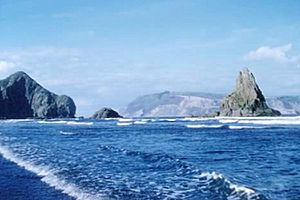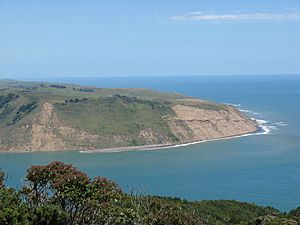Manukau Heads facts for kids
The Manukau Heads is the name given to the two promontories that form the entrance to the Manukau Harbour - one of the two harbours of Auckland in New Zealand. The southern head, at the northern tip of Āwhitu Peninsula, is simply termed "The South Head", whereas the northern head is named "Burnett Head" (the term North Head is used to indicate a promontory in the nearby Waitematā Harbour). Both heads are hilly areas of land that rise steeply from the water to over 240m within less than 400m of the shoreline.
There is a pronounced sand bar across the harbour mouth which has limited shipping into the harbour since European vessels arrived in the area which had enough draught to be affected by such shallows. This limitation (which ensured an effective maximum ship size of about 1,000 tons in pre-modern times), was no barrier to early success of shipping to local ports in the harbour - but eventually meant that the Waitematā Harbour overtook the Manukau Harbour in prominence as a port location.
New Zealand's worst maritime disaster occurred just offshore in 1863 when HMS Orpheus ran aground on the Manukau Bar and sank with the loss of 189 lives. The area remains dangerous for watercraft, with one death each in 2005 and 2010 when pleasure craft capsized or were swamped near the bar.
The Manukau Harbour Bar was first crossed in a surf boat by a crew from Piha Surf Life Saving Club who rowed from Onehunga to Piha in over five hours in high swells and stiff winds in 1992. A crew from Piha had attempted this row in 1971 but was caught out by rising swells closing out the northern channel and after attempting to catch a "smaller" wave into the beach lost their boat when it was smashed on to the beach by a dumping wave.
Archaeology
The Brambley Collection in Auckland Museum has been described as the most important collection of Maori artefacts in the Auckland region. It came from the Matatuahu archaeological site, which lies at the foot of the South Head cliffs.



